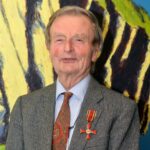Folker Hanefeld was born and grew up in Meißen in Saxony/ East Germany. After finishing school and because he was not allowed to study in East- Germany (GDR) he went to Cologne University, West Germany, where he studied Medicine from 1956 to 1961. In Cologne he also wrote his doctoral thesis at the Max-Planck-Institut für Hirnforschung (Max-Planck-institute for brain research) on a topic in experimental brain tumor pathology.
In 1965 he moved to (West-)Berlin to become a pediatrician at the Kaiserin Auguste Viktoria Haus zur Bekämpfung der Neugeborenen- und Säuglingssterblichkeit (KAVH; Children´s Hospital of the Free University of Berlin). Supported by a scholarship he stayed at the Department of Pediatric Neurology (J. Wilson) at the Hospital for Sick Children Great Ormond Street and the Department of Neuropathology (L.Crome) at Queen Mary`s Hospital, London from 1969 to 1972. There, he intensively dealt with the neuropathology of brains of those in Carshalton hospitalized children suffering from severe epilepsies who had deceased. Back at Berlin Free University Folker Hanefeld became consultant and finally Director of the newly founded neuropediatric department at KAVH.
In several regards Folker Hanefeld’s manner of leading a department differed remarkably from other more traditional German specialists for cerebral palsy or pediatric epileptology resp. electroencephalography at that time. In fact, he was a representative of a modern, open minded neuropediatrician and leading physician in general: For instance, he early recognized the benefit of collaboration with medical experts in other fields of neuroscience e.g. biochemistry or imaging techniques. This multidisciplinary approach with constant incorporation of other specialties in clinical and research matters led to a profound increase in knowledge on pathogenic mechanisms and clinical presentations in lysosomal (seventies of the last century), mitochondrial (eighties) and diseases of the Golgi-apparatus (nineties). Moreover, this led to the discovery of new diseases like creatine deficiencies. He was the first to show that multiple sclerosis (MS) already can start in early childhood.
The profound scientific contribution of Folker Hanefeld amounts to 257 Pubmed listed citations, most of them with him being first or last author. Astonishingly, more than 50 of these were published after his retirement in 2002 .
His professional time of half a century in neuropediatrics can be seen as a gold digger period of neuropediatrics: The space here allows just to mention a few topics:
- Enzyme patterns in brain tumors
- Mental retardation spectrum, including Rett syndrome (including clinical criteria of Rett syndrome and first description of early seizure variant, todays CDKL5 syndrome)
- Neuropathology of epilepsies
- Kernicterus in neonates
- Side effects of acute lymphoblastic leukemia and its treatment
- Neuromuscular diseases
- Disorders of lysosomal, mitochondrial and Golgi-apparatus cell organelles
- Leukodystrophies like Vanishing white matter disease, creatine deficiency
- Childhood multiple sclerosis
- MR-Spectroscopy as a new tool in Neuropediatrics
Folker Hanefeld organized many seminars addressing young medical doctors to inform and to interest them in the new and just developing specialty of child neurology. Outstanding in its conduction and often impressive for those who attended was the so called “Ungelöster Fall – unsolved case” seminar, in which international experts tried to unfold etiopathogenetic diagnoses for the most cryptic cases of all areas of child neurology.
Folker Hanefeld was one of the founding members of the German speaking Society for Neuropediatrics (“Gesellschaft für Neuropädiatrie” (GNP) in Austria, Switzerland and Germany). He twice became president of the GNP, also served as its secretary and organized GNP annual meetings in 1979 (West-Berlin) and in 1989 (Göttingen). Likewise, he was very active on a European level and served as a member of the first board of the European Pediatric Neurology Society (EPNS), and being EPNS-President he organized the EPNS congress in Baden-Baden in September 2001. Folker Hanefeld had very close contact and often friendship with the most prominent neuropediatricians of his time, especially mentioned should be Bengt Hagberg, Peter Barth, Jean Aicardi, Yukio Fukuyama, Hugo Moser, Izumi Takahashi, John Wilson. For his scientific and professional contributions he was honoured by multiple national and international organizations receiving the doctor honoris causa of the Gothenburg university, the Segawa Price Lecture Award of the Japanese Society for Child Neurology, the Swedish Child Neurology Award, and the Peter Emil Becker-award of GNP.
To describe his special personality as scientist and clinician: His scientific talks were precise and opened the mind of the audience for new insights and always came with a surprise and an original remark. He had an impressive aptitude to recognize characteristic clinical patterns, especially in the field of genetic syndromes as well as in the field of metabolic and neurodegenerative diseases. Importantly and in addition to his diagnostic skills, he was able to build and maintain a special and very direct relation to his patients, their parents and families, often right from the beginning of consultations. Without public emphasis he was consultant in social-pediatric activities in Berlin as well as in Göttingen.
At a time, when selfhelp organizations were not infrequently seen as opponents to medical professionals, he contacted, supported, and empowered them. Especially for this advocacy, particularly in the parent-organization of children with “Rett-syndrome” he received the highest award of the Federal Republic of Germany for services to common good (“Bundesverdienstkreuz am Bande”).
Those who worked with and learned from Folker Hanefeld experienced him as an open-minded and unpretentious colleague and academic teacher,– untypical for a German professor at that time. He was interested in the academic education as well as the family lives of the staff of his department being able to well balance out a personal relation and a professional distance; summer parties at the Hanefeld house and garden for all coworkers of his department including their families were examples of this interest and dedication.
With his wife Roswitha, a high school English teacher, he had three sons, one daughter and eight grandchildren and led an empathic family life.
Folker Hanefeld died in May 2022. His death means a significant loss to his family, but likewise to the international community of neuropediatricians.
Ulrich Stephani (Kiel) / Dietz Rating (Berlin)

